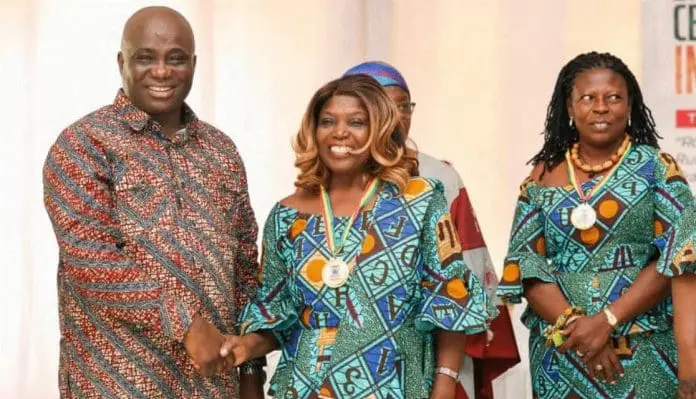By Ghana News
Copyright ghanamma

Ghana’s agricultural transformation hinges on empowering women farmers through targeted government programs and expanded access to modern farming technologies, Agriculture Minister Eric Opoku declared at a major industry gathering in Accra.
Speaking at the second Annual General Meeting of the Ghana Association of Female Agricultural and Fish Farmers Award Winners (GAFAFAW), Opoku emphasized that women remain the backbone of Ghana’s food systems and must be empowered to play a leading role in shaping the future of agriculture. The event, held under the theme “Rooted in Experience, Rising in Leadership: Rural Women at the Heart of Agricultural Transformation,” brought together award-winning female farmers from across the country.
The Minister outlined ambitious plans under the government’s Feed Ghana Programme, implemented through the Agriculture for Economic Transformation Agenda (AETA), to address longstanding barriers facing women in agriculture. The initiative promises enhanced access to modern farming technologies, expanded extension services, support for value addition and agro-processing, promotion of climate-smart agriculture practices, and improved market and financial access.
Opoku’s remarks highlight a strategic shift in Ghana’s agricultural policy, recognizing women’s pivotal but often undervalued contributions to the sector. Rural women serve multiple roles as farmers, processors, traders, and innovators who sustain both households and national food systems, he noted, while acknowledging their expertise frequently goes unrecognized.
The timing of these commitments proves particularly significant as Ghana grapples with food security challenges. The country faced decreased agricultural production in 2024 due to drought conditions, underscoring the urgent need for agricultural innovation and resilience-building measures.
GAFAFAW, established in 2023, represents a unique coalition of twenty award-winning female farmers from all sixteen regions of Ghana. The association aims to champion the cause of women in the agricultural sector through networking, skills-sharing, and mentorship programs. Since its launch, the organization has emerged as an influential voice in national policy dialogues and agricultural development discussions.
The association’s Chairperson, Ernestina Osei-Tutu, has previously called on government and institutions to provide greater recognition and support for rural women farmers. Her advocacy emphasizes that rural women remain central to the country’s agricultural transformation and economic development.
Minister Opoku praised GAFAFAW’s achievements in its brief existence, particularly commending the organization’s advocacy work in national policy discussions and its mentorship initiatives supporting smallholder farmers. The Minister’s endorsement signals growing government recognition of organized women farmers as key stakeholders in agricultural policy development.
The Feed Ghana Programme represents President John Dramani Mahama’s administration’s flagship agricultural initiative, designed to revitalize the sector through comprehensive reforms and targeted investments. Opoku unveiled the innovative program in April 2025 as part of broader efforts to modernize Ghana’s agricultural economy.
However, significant challenges persist in ensuring equitable access to agricultural opportunities. Female farmers in northern Ghana and the Volta Region continue struggling to access arable lands due to traditional beliefs that prohibit women from owning parcels of land, highlighting the complex cultural barriers that government programs must address alongside technical and financial constraints.
The Minister’s commitment to women’s agricultural empowerment reflects broader recognition across Africa of women’s crucial role in food production and rural economic development. Women farmers constitute a significant portion of agricultural producers across the continent, yet they often face disproportionate challenges in accessing credit, land rights, technology, and markets.
Looking ahead, the success of Ghana’s agricultural transformation will likely depend on the government’s ability to translate policy commitments into tangible improvements for women farmers. The collaboration between the Ministry of Food and Agriculture (MoFA) and organizations like GAFAFAW represents a promising model for inclusive agricultural development that could serve as a template for other West African nations.
The emphasis on women’s leadership in agriculture also aligns with international development goals focused on gender equality and food security. As Ghana works to build a more resilient agricultural sector, empowering women farmers emerges not as a social imperative alone, but as an economic necessity for sustainable growth and food security.